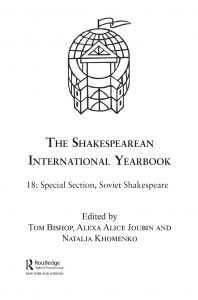
Due to Karl Marx’s frequent references in his political treatises, Shakespeare held a significant place in a number of communist and other left-authoritarian countries, including China and the USSR. And although there were themes in Shakespeare that turned out to be inconvenient for communist ideology, other Shakespearean plays were put into service. In Part I of this volume of the Yearbook, the special section of chapters explores the vicissitudes of artistic and political uses of Shakespeare in Soviet culture and ideology after the October Revolution in 1917, including in some of the continuing resonances of those uses since the collapse of the Soviet Union. And while the real and perceived resistance to prevailing ideologies of Soviet directors has tended to capture recent critical attention, there is a wide range of Soviet and post-Soviet interpretations of Shakespeare.
Scholarship on global Shakespeare has drawn more frequently on Sergei Iutkevich’s Othello (for its influence outside the USSR) and on Grigori Kozintsev’s mid-century films of Hamlet and King Lear, since Kozintsev is seen as a political dissident. In Part II of this volume, Tom Ue presents interviews with novelist Lisa Klein and filmmaker Claire McCarthy, creators of two recent revisionings of Ophelia’s story, and John Mucciolo discusses recent work in Shakespeare studies in the review essay format, which is a regular feature of the Yearbook.
Open-access chapter:
Alexa Alice Joubin and Tom Bishop, Preface, The Shakespearean International Yearbook Volume 18, ed. Alexa Alice Joubin and Tom Bishop (Routledge, 2021).
